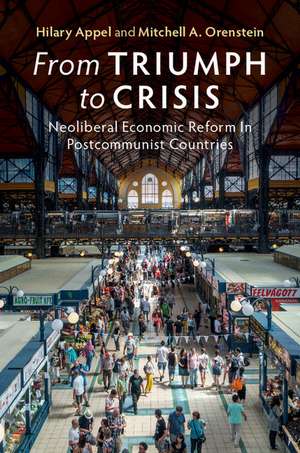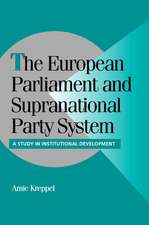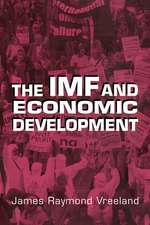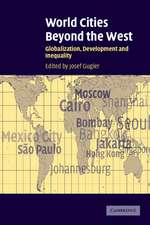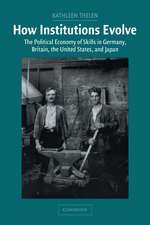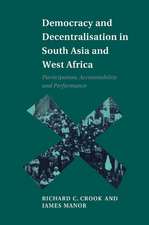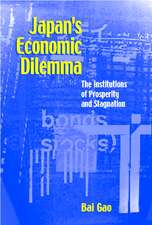From Triumph to Crisis: Neoliberal Economic Reform in Postcommunist Countries
Autor Hilary Appel, Mitchell A. Orensteinen Limba Engleză Paperback – 9 mai 2018
Preț: 227.38 lei
Nou
Puncte Express: 341
Preț estimativ în valută:
43.52€ • 47.29$ • 36.58£
43.52€ • 47.29$ • 36.58£
Carte tipărită la comandă
Livrare economică 18-24 aprilie
Preluare comenzi: 021 569.72.76
Specificații
ISBN-13: 9781108435055
ISBN-10: 110843505X
Pagini: 254
Dimensiuni: 150 x 228 x 13 mm
Greutate: 0.36 kg
Editura: Cambridge University Press
Colecția Cambridge University Press
Locul publicării:Cambridge, United Kingdom
ISBN-10: 110843505X
Pagini: 254
Dimensiuni: 150 x 228 x 13 mm
Greutate: 0.36 kg
Editura: Cambridge University Press
Colecția Cambridge University Press
Locul publicării:Cambridge, United Kingdom
Cuprins
1. Triumph and crisis of neoliberalism; 2. First phase: the Washington Consensus; 3. Second phase: Europeanization; 4. Third phase: avant-garde neoliberalism; 5. Competitive signaling and foreign direct investment; 6. The crisis of neoliberalism; 7. Revising transition theory.
Recenzii
'From Triumph to Crisis argues that after 1989, postcommunist states adopted increasingly radical neoliberal reforms as they competed with each other for much-needed foreign investment. While many scholars have emphasized the importance of international influences in post-communist transformations, this provocative and well-written book is the first to take on the transition paradigm's mistaken over-emphasis on domestic dynamics, explain exactly how and why it led us astray, and offer a comprehensive alternative explanation. It should be widely read by social scientists and policy makers interested in understanding how neoliberalism steadily and deeply reshaped the post-communist region after 1989.' Juliet Johnson, McGill University, Montreal
'The phrase 'more Catholic than the Pope' well describes the attraction that postcommunist elites had for neoliberal reforms in the period 1989–2009. Despite the massive social costs involved, the postcommunist countries embraced neoliberal reforms with zeal, and persisted with them through boom and bust. The easy explanation for this embrace is ideological and cultural. That after forty years of communism these states could not get to capitalism fast enough. Appel and Orenstein give us a better answer. Forty years of communism destroyed the capital stocks of these countries and they had to be rebuilt with FDI. To get that inflow they had to signal that they were indeed 'more catholic than the pope' when it came to neoliberal reforms. Its partisans like to think that neoliberalism drives capital forward. What Appel and Orenstein show us is that competition for capital drove neoliberalism forward. Rather than ideas driving policy, we see necessity driving the adoption of ideas.' Mark Blyth, Brown University, Rhode Island
'Countries in the postcommunist world that launched and sustained radical market reforms have achieved much better outcomes than states which followed alternative approaches. But it is not sufficient to explain the popularity of these reforms among many (but not all) postcommunist governments. This book provides an excellent overview of market reforms in the postcommunist countries and a critical analysis of the political economy explanations of these reforms. Against this background, the authors propose their own thought-stimulating theory based on 'competitive signalling'.' Leszek Balcerowicz, Warsaw School of Economics
'These two authors are excellent stewards through this retrospective of the postcommunist transition process and the relevant literature, guiding us through the policy laboratories of Eastern European countries since the fall of the Berlin Wall.' Julia Gray, Perspectives on Politics
'The phrase 'more Catholic than the Pope' well describes the attraction that postcommunist elites had for neoliberal reforms in the period 1989–2009. Despite the massive social costs involved, the postcommunist countries embraced neoliberal reforms with zeal, and persisted with them through boom and bust. The easy explanation for this embrace is ideological and cultural. That after forty years of communism these states could not get to capitalism fast enough. Appel and Orenstein give us a better answer. Forty years of communism destroyed the capital stocks of these countries and they had to be rebuilt with FDI. To get that inflow they had to signal that they were indeed 'more catholic than the pope' when it came to neoliberal reforms. Its partisans like to think that neoliberalism drives capital forward. What Appel and Orenstein show us is that competition for capital drove neoliberalism forward. Rather than ideas driving policy, we see necessity driving the adoption of ideas.' Mark Blyth, Brown University, Rhode Island
'Countries in the postcommunist world that launched and sustained radical market reforms have achieved much better outcomes than states which followed alternative approaches. But it is not sufficient to explain the popularity of these reforms among many (but not all) postcommunist governments. This book provides an excellent overview of market reforms in the postcommunist countries and a critical analysis of the political economy explanations of these reforms. Against this background, the authors propose their own thought-stimulating theory based on 'competitive signalling'.' Leszek Balcerowicz, Warsaw School of Economics
'These two authors are excellent stewards through this retrospective of the postcommunist transition process and the relevant literature, guiding us through the policy laboratories of Eastern European countries since the fall of the Berlin Wall.' Julia Gray, Perspectives on Politics
Notă biografică
Descriere
Explains the surprising endurance of neoliberal policymaking over two decades in post-Communist countries, from 1989–2008, and its decline after the financial crash.
